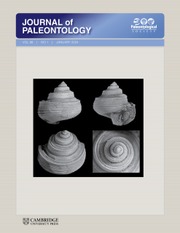
Many thanks to Scott Lidgard and my nominators, the Paleontological Society, and its committees for this award. Many whose work I deeply admire stand on the Schuchert Awardee list, and I am honored and daunted to receive this award. This is the year of COVID-19. I hope my Paleontological Society family is coping well and staying optimistic.
I would like to thank the many people who have influenced and helped me, by way of a bit of personal history. As a teen, I was actually determined never to study biology, simply because my mum taught biology, my dad was a microbiologist, and my older sister was studying to be a medical doctor. But I wavered after listening to an introductory lecture from Peter Ng from the University of Singapore who suggested we read Steven J. Gould's books.
At the University of Singapore, geology and paleontology were not offered. But I had some great mentors at my undergraduate alma mater: Jon Baldur Sigurdsson, a malacologist, also Iceland's consul in Singapore then, and Navjot Sodhi, an ornithologist. After a Master's degree in conservation biology in Sweden, I started on a PhD Program at the Committee on Evolutionary Biology at the University of Chicago, planning to work on tropical conservation biology. But everything changed when I took Leigh Van Valen's legendary class, Evolutionary Theory.
I think Leigh sensed that I was lost, as a foreigner in the U.S., and as a tropical biologist wishing instead she could be a paleobiologist, but was afraid to try. I spent hours with Leigh, in his office so full of stacks of books and papers one hardly had a spot to sit or stand. We talked about everything from quantum mechanics to music and mental illness to mammals. Leigh encouraged me to talk to as many faculty members and students as possible, in order to discover myself.
I “shopped around” the stupendously many faculty available to me at CEB, and finally found Scott Lidgard. Scott gave me exactly the right combination of emotional support, intellectual freedom and scientific stimulation. Scott gave me “tough love” to guide my science and to help me jump through all the hoops I needed to for an academic career. The hardest one was actually opening my mouth. I was afraid of asking questions in public settings, afraid of speaking to other scientists—even my fellow students—because I felt my questions were not worth asking and my opinions not worth voicing. I am not always right, but I am no longer afraid of being wrong or ignorant. I am forever grateful for Scott's advice, friendship, and mentoring. Leigh, Sodhi, Siggy, you live in my heart and mind forever. And my family in Singapore, I am grateful for your being gracious about my living this far away from you so I could pursue my dreams. I know it's not easy.
In grad school, I benefited tremendously from too many faculty members, both in Chicago and elsewhere, to list here. Pete Wagner's and David Jablonski's suggestions from our conversations often took me months to implement, but they were always time worthwhile. I am indebted to Michael Foote for the many conversations we have had over all kinds of beverages, about morphological disparity, the “hat” distribution, and how learning statistics should be like getting a good sun-tan, not a bad sun-burn. Gene Hunt saved me from utter despair when I was writing my first loop in C in the Hinds “holding pen,” and I am grateful for his continued generosity.
Chicago was a tough place for a foreign Asian female paleobiology student, but my dear friends kept me going: Bjarte Hannisdal, Carl Simpson, JJ Emerson, Wolfgang Kiessling, Al McGowan, Rebecca Rundell, Melanie Hopkins, Penny Lun—I thank you all and many others I cannot list here, for embracing me for who I exactly am and being there for me. Special thanks to Paul Harnik, with whom I had such severely heated, but deeply honest arguments, that I thought that he was going to walk out of our friendship. But Paul stayed. He asks the sharpest questions, and has the deepest insights, not just into our field but into being human.
I also want to thank my colleagues in Oslo for letting me babble on about paleobiology in a place without prior tradition of this field. I really enjoy working with Trond Reitian, Torbjørn Ergon, Kjetil Voje, Thomas F. Hansen, and Russell J.S. Orr because they challenge me, make me think hard, but also laugh. To my new family, Paul Taylor, Emaneuala Di Martino, Dennis P. Gordon, and many other bryozoologists, including my long-time friend and mentor Scott Lidgard, thank you for welcoming me to your fascinating world. I hope I can help to inspire many more to use bryozoans as their study system.





